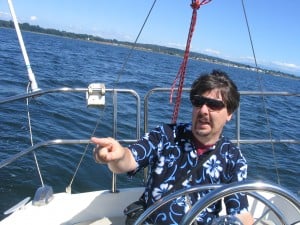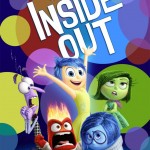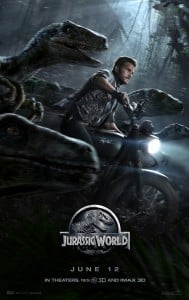 This review of Before Midnight is Part Three of the new fiction series I call All Thumbs Video.
This review of Before Midnight is Part Three of the new fiction series I call All Thumbs Video.
In the first installment, I introduced a small cast of characters, friends who talk about movies in one of Earth’s last video stores — All Thumbs, a store named in honor of Roger Ebert. They’re members of “Sight Club,” watching movies in theaters and, late at night, in the store’s back room, then engaging in vigorous discussion. They argued about Terrence Malick’s To the Wonder.
In the second chapter, they discussed Iron Man 3.
What are my thoughts about Before Midnight? I love it more than anything else I’ve seen in 2013 so far. And yet, I’m conflicted. I’ve stirred my mixed feeling into the batter of this review.
Note: I reserve the right to continue editing and polishing the review in second and third drafts over the first week of its publication. Feel free to send corrections or questions in an email or a comment. I’ll make repairs with gratitude.
Enjoy.
–
In the twilight blue of a late evening in June, Dennis parked the BMW in front of Zack’s Pizza. As he ambled up the Nickerson Street sidewalk to All Thumbs Video, the pizzeria’s sandwich board blazed with capital letters announcing Zack’s new Superman-themed pizza.
He winced. It was called “The Super-oni,” and it promised an S-shaped swath of hot red peppers over its generous pepperoni layer.
Well, he thought, at least it’s better than last week’s “Enterprise” pizza. That pesto-glazed pie had been intended, unsuccessfully, to resemble the famous Star Trek spaceship’s large disc — a cherry tomato in the middle, broad slices of thick mozzarella, and olive slices meant to represent pock-mark scars from enemy cannon fire.
Most American moviegoers would be unable to resist Zack Snyder’s Man of Steel this weekend. They’d walk right past the movie he’d been anticipating for a whole decade, the third in a series as important to him as any ongoing franchise.
Just as Dennis was getting to know Linnea, the college classmate he would later marry, Richard Linklater’s Before Sunrise had opened. They had seen the film in the theater together three times, and as the lead characters — Jesse, the pretentious rascal played by Ethan Hawke, and Celine, the bookish feminist played by Julie Delpy — were the same age as Dennis and Linnea, it felt like a date movie custom-made for them.
Jesse and Celine had met on a train and impulsively spent the night walking through Vienna and talking about politics, art, gender roles, and the tension between true love and mere “romance” or sentimentality. Dennis and Linnea had emerged from the movie charged up for amorous arguments of their own. And they had promised to build their dating life around events that would demand two things: walking and discussion. It had been the foundation of a relationship unlike any they had known.
Even now, he could not separate his love of Before Sunrise from his love of watching Linnea watch Before Sunrise. Tears filled her eyes whenever that moment came: The one where Celine looks out the bus window and Jesse reaches out impulsively, almost running his fingers through her hair. She wanted to be loved like that, and he knew it. And he wanted to be in love like that. And they were. And it was perfect.
Dennis and Linnea had dated for two years, broken up, dated others, and then reunited after similarly catastrophic breakups. It had been a fiery reunion, nine years later, and lo — a sequel! Before Sunset had opened, reuniting Jesse and Celine, and giving Dennis and Linnea an unexpected infusion of hope for their relationship re-boot.
In that 2004 sequel, it became clear that Jesse, now a successful author, had not kept up with Celine. In fact, they’d been out of touch for a decade. But when Celine showed up at Jesse’s Paris book tour, he quickly changed his plans in hopes of rekindling the flame. Never mind that Jesse had a wife and a son back in the U.S. — clearly, he and Celine were meant for each other. And the film’s painful, exquisite tension had everything to do with the possibility that he might abandon his family commitments for a passionate affair.
By contrast, Dennis and Linnea had no such responsibilities to worry about. Before Sunrise resonated not because of its depiction of an affair, but because it was about the gravitational pull of a chemistry that they now recognized as substantial and lasting, where other relationships had flared up and gone out like strings of sparklers. They had brushed off Jesse’s ethical dilemma, believing that the obvious choice for him and for Celine was to give in to seductive idea of a climactic consummation. And, as with the first film, the movie ended with a lot unresolved.
Dennis’s friend Steven Dark, who worked at All Thumbs, had seen the third film, Before Midnight, two months earlier at a press screening. Usually, he would have invited Dennis along, but publicists had forbidden reviewers to bring guests this time. So, for two months of Dennis’s visits to All Thumbs, Steve had teased him mercilessly with hints — and with an enthusiastic five-star rating on the All Thumbs magnetic chalkboard.
But today — June 14, 2013 — Dennis had shown up for the Sight Club’s opening-day matinee gathering. He had already resolved not to tell his wife about it. She wouldn’t be free to see it until Sunday, and she would kill him if she discovered he’d seen it before her. But, he told himself, Steven had driven him to this. He had to see it so he could compare notes with his friend.
Tonight, Dennis had come to the shop tonight for another Sight Club event. Steven had urged members to assemble in the small viewing room at the back of the store to watch Viaggio in Italia, a rarely seen film by Roberto Rossellini in which, yes, a husband and wife travel to Italy, discuss life, love, trouble, and a tenuous future. Steve had been raving about it, and he said that it was a perfect selection for the opening weekend of Before Midnight. (Rosselini’s film had recently been highlighted by film enthusiasts and critics at ArtsandFaith.com as the #1 movie about marriage ever made.)
But the real reason Dennis wanted to attend was to see Amy. Again.
He’d been driving around, arguing with himself, all afternoon. (This semester, he didn’t teach any Friday film classes at the community college down the street.) Sight Club members had planned to attend a Before Midnight opening-day matinee for months. But when he showed up at Regal Thornton Place Stadium 14, Amy was the only Sight Clubber in the theater, and one of only six moviegoers altogether. Meanwhile, next door, Man of Steel was pummeling a full house with sound, fury, and CGI.
Amy was the only woman Dennis had ever met whose appetite for movies was larger than his own. And she didn’t pursue just any movies. She wanted something disruptive, something that would shake loose clichés and formulas, something barbed with the jagged edges of real life. Something like Before Midnight. And his conversations with her, like those of the lovers in the movie, had an unpredictability that he found intense and exciting. They both knew that an argument about a movie was an argument about their heads and hearts — about things that they believed, hoped, loved, and knew from experience.
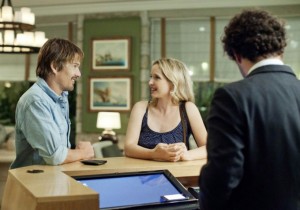 Watching Before Midnight, he had experienced something like terror. Jesse and Celine… they felt like they belonged to him and his wife. And if Linnea had been able to leave the office, he would have brought her along. She would have gripped his hand throughout the matinee in a way that would have told him how she felt about every scene.
Watching Before Midnight, he had experienced something like terror. Jesse and Celine… they felt like they belonged to him and his wife. And if Linnea had been able to leave the office, he would have brought her along. She would have gripped his hand throughout the matinee in a way that would have told him how she felt about every scene.
Instead, his attentions were divided between the bright digital projection and Amy, the freelance graphic designer. And as the film played out, he found himself thrilling to Amy’s laughter at the big surprises in the opening moments. He could feel her holding back from shouting things she wanted Celine to tell Jesse during an argument, or muttering criticism of Celine’s self-interested rants. He sensed her breathless worry as Jesse and Celine took another long walk — in Greece this time — across the rocky terrain of their personal history. Her anxiety, as the characters clashed in a debate, had a gravitational pull.
When a scene of startling physical intimacy unfolded — something that Before Sunrise and Before Sunset had left to viewers’ imaginations — Amy’s hands had gripped the edge of her leather backpack like she would tear it in two for… what? Jealousy? Ecstasy?
He found himself wondering what he would do if she reached for his hand. He found himself tempted to reach for hers. But then came the argument — a clash between Jesse and Celine so epic, and so familiar, that it left him gasping for breath.
During the film’s final scene, Amy briefly rested her head on his shoulder. And as the credits rolled, he was ruined, staggering up the aisle and fighting the compulsion to run out into the light. He could feel Amy walking behind him, but he could not bring himself to turn, not until he heard his car door locks give their surrendering chirp. When he did, she was gone.
Now, alone and exhausted, he found Steve standing in the All Thumbs display window, a sight as bright as a movie screen in a dim theater. Steve was assembling a cardboard display for Upstream Color on which the lead actor embraced the lead actress in a bathtub — yet another film about a man and woman caught between saving and destroying one another.
As Dennis stepped in, he said, “Hello, Steve Bastard.”
“Hello, The Phantom Dennis.”
“What’s hot tonight?” He pretended to be a customer who would watch whatever was popular.
“The Hobbit! It’s like they took all the best moments from The Lord of the Rings and made them better!” Steve couldn’t disguise his contempt for Peter Jackson’s movie even when joking about it. “You know what I always felt after reading The Hobbit as a kid? This book is boring. The characters should be hunted by orcs! They should have to fight their way to freedom every ten minutes!”
“You know what I always wanted?” said Dennis in mock excitement. “I wanted them to get rescued by bunny rabbits. Bunny rabbits who save the day by leading the orcs… not away from the heroes, but instead, in a meandering fashion…”
“Serpentine!” shouted Steve, a big fan of The In-Laws. “So… are you actually here for Sight Club?”
“Yeah, but I’d really rather just sit and talk about Before Midnight.”
“Aw, come on,” said Steve. “I just saw Joss Whedon’s Much Ado About Nothing. Can we talk about that instead? I tell you, listening to Benedick and Beatrice argue… it was surreal. It was like listening to you and Amy.”
Dennis flinched. He reached across the counter to scratch the head of the shop’s volunteer cat, Carmine the Calico, who sat in the cashier’s chair. “No,” he said. “Let’s talk about a movie I’ve actually seen.”
“It messed you up, didn’t it? Seeing Jesse and Celine fight like that.”
“It messed me up,” Dennis agreed. “It really, really did. In my mind, they’re still two twenty-somethings, infatuated on the train. Watching them act out a clash of the Titans, like bitter and disillusioned adults… ugh. We’re old, Steven. We’re old.”
“I think it’s as good as any movie I’ve ever seen about the hard work of being a couple. And about being middle-aged,” said Steve. “That’s why I’m setting this up.” He picked up a stack of DVDs and blu-rays from the floor and started arranging them on a display labeled THIS WEEK’S FILM FESTIVAL. On the chalkboard panel across the top, he had scribbled “A MAN AND A WOMAN TALK AND TALK.” One by one, he set up Eternal Sunshine of the Spotless Mind, Viaggo in Italia, Before Sunrise, Before Sunset, Chasing Amy, Kenneth Branagh’s Much Ado About Nothing, and Certified Copy.
“Well,” he sighed, admiring his handiwork “I don’t think many are going to show up tonight. And, I hate to say this, but I have to leave.”
“What? Why?”
“Promises to keep,” Steve groaned. “And miles to go before I sleep.”
“Promises?”
“The woman who lives in the apartment next to mine. I said I’d feed her cat while she’s on a camping trip.”
“Why do I feel like there’s more to this story?”
Steve smirked. “There isn’t.”
“Yet.”
Steve shrugged. “Yet.”
“Aha!” Dennis was intrigued, happy aim his attention at somebody else’s relationship turmoil. “So, you get to explore her place while she’s gone. Leave notes and things. Maybe surprise her by, I don’t know… cleaning out the oven.”
“Defrosting the freezer, actually. It’s a solid block of ice. God knows what’s in there.”
“This is how it starts. An epic romance. I feel it. What movie will you recommend to her first? The New World? Before Sunrise?”
“I’ll be back before you and Amy are done watching the Rosselini film. If one of you leaves early, make sure the other one locks the door. My boss is taking a gamble, trusting me to have guests here after hours. Don’t get me fired.”
“Wait, me and Amy? Nobody else is showing up? Not even Pastor Bruce?”
“Amy’s already here.” Steve pointed toward the back room, which opened at the end of the curtained Aisle of Porn. “Nobody else RSVP’d.”
Dennis’s heart slammed against his ribs. “Right, then.”
Steve’s brow furrowed. “You okay with that?” he asked quietly. Then, under the arc of an eyebrow, he said, “You were the only ones at the matinee today. Oh, wow. Awkward?”
“No problem.” Dennis shrugged and pretended to be interested in a previously-viewed blu-ray of The English Patient. “You know me.”
“Yeah,” said Steve. “I’m afraid I do.” He pulled the cord on the OPEN/CLOSED sign, then locked the front door. “I need to package up the cash and checks and run receipts, wipe down the counters, and then I’m off. You can start the movie.”
Dennis took a deep breath, scooped up the cat from the chair, and carried her against his chest, like a shield, as he marched toward the back of the store.
In the small viewing room, Amy sat at one end of a couch in the middle of a half-circle of cushioned chairs before a big-screen plasma TV. Her dark hair was down. She was wearing jeans with torn knees and, under an open plaid-flannel shirt, her favorite film festival t-shirt which said “So many subtitles, so little time.” She was hugging a pillow, a copy of Film Comment open on her lap, and an iPad glowing on the couch beside her. “Oh,” she said, “it’s you.” She quickly picked up the iPad.
But he did not join her on the couch. With all of the options, that would have been a major decision, like pulling the cord on the “OPEN” sign over his heart. But it would have been strange to sit on the opposite side of the half-circle, so he took the chair beside the couch. “Actually, it’s Carmine,” he added. “I’m just her bodyguard.”
The cat purred at Amy as if she knew exactly what unspoken feelings were already pulsing in the air.
“You seemed deep in thought after the movie today,” said Amy. “What’s your verdict?”
“Before Midnight?”
“No, The Hangover 3. Of course, Before Midnight.”
“Isn’t it the first rule of Sight Club, that we can’t discuss this until tomorrow?”
“That didn’t count as a Sight Club gathering,” she countered. “Only two members showed up. We’re free.”
“Good point.” He was glad, actually, that she wanted to talk about something other than their awkward parting in the theater parking lot. “But I get the feeling you’re the one with strong feelings about the movie.”
“I want to kill Richard Linklater,” Amy announced. “And Julie Delpy, too.”
“Why?”
 “Because in Before Midnight, they show us that Celine has grown up into a total bitch. She spends so much of the movie being self-absorbed and paranoid. And just downright mean to Jesse. She’s like a character manufactured by a man who wants an excuse to punish his wife for all of the ways she annoys him. She’s a nightmare.”
“Because in Before Midnight, they show us that Celine has grown up into a total bitch. She spends so much of the movie being self-absorbed and paranoid. And just downright mean to Jesse. She’s like a character manufactured by a man who wants an excuse to punish his wife for all of the ways she annoys him. She’s a nightmare.”
“You’re kidding. Really?” Dennis kept his eyes focused on Carmine, which was difficult, because the cat refused to settle down, her tail twitching and her attention focused on Amy. “Didn’t Linklater write the screenplay in collaboration with Julie Delpy and Ethan Hawke?”
“That’s just it. I can’t believe Julie Delpy signed off on this.”
“Oh, I think you’re overreacting. I’m still in love with Celine. Sure, she’s kind of ferocious about feminism and her career. But she has to be — doesn’t she? She has to push back against cultural forces and demand the respect she’s due. I mean, she works as a political activist. She has to be aggressive. It’s her job. And face it… Jesse’s a world-famous author. He can’t possibly understand what life has been like for her while he tours the world being famous.”
“She treats everything that Jesse says to her as a threat. He’s troubled. He’s confused. He’s just trying to find a way to be a good father to the son from his previous marriage. But he’s in this predicament because… he… loves… Celine. Sure, he has female fans around the world who want to get into his pants. But he keeps coming back to Celine. She’s the one. He listens to her. So what does she do? She acts like she’s just waiting for a reason to punish him. Even though they have two…”
“Careful!” said Dennis, imitating Steve. “Spoilers! Don’t ruin it for the customers!”
Amy slapped her hand over her mouth in mock horror.
“Seriously, though,” said Dennis. “Steven was a lucky bastard. He saw this movie without knowing anything about it ahead of time. He didn’t see a trailer, didn’t read a review, didn’t hear an interview. I envy him. He got to experience all of those surprises in the first ten minutes without any warning. I wish everybody could see it that way.”
“Don’t change the subject, Dennis.” She glared in challenge through her glasses. “Jesse is building his life around a future with Celine. He’s making sacrifices. And he doesn’t pick fights — he tries to resolve them. Celine, on the other hand, starts throwing grenades at the slightest provocation. How can he win, when she treats him as representing centuries of chauvenism and oppression. He listens to her the way you listen to me. But when he responds respectfully, she reacts by expanding her attack to include ten more accusations.”
“Their arguments,” sighed Dennis, “are so…”
“Excruciating.”
“I was going to say ‘real.’”
Amy looked at him for the first time through her librarian glasses, with a studious expression. “That’s interesting. Trouble on the home front, Dennis Farmer?” She wanted it to be true — he could feel it.
“I feel like every scene in this movie could have been inspired by scenes I’ve lived through,” he said. “I mean, I’ve never been on a getaway to Greece. I’ve never had a book published. But I’ve seen Linnea threatened by my job, my intellectual pursuits, the conversations I have with my students. I’ve been neglectful of her. I’ve made decisions without considering how they’ll affect her.” He combed all ten fingers back through his wiry red hair, talking as if he might transport his wife into this room to save him from his own increasing attraction to the young woman sitting barefoot on the couch. “Linnea thinks that I think of her as… you know… the help.”
Amy scowled. “Yikes.”
“But she is so much more than that,” he sighed. “I feel like I understand Celine. If I have any gripe against her, it’s that she feels like Jesse owes her his allegiance. That’s not fair. He and Celine aren’t married. No promises have been made, as far as I can tell. Fact is, she baited him into breaking his previous commitment.”
Amy looked down at her magazine again. “She didn’t bait him. He knew what he was doing.”
“She conveniently treats his former marriage like some kind of foolishness he should just leave behind him. But, I mean… he got married. He had a child. Going back to Celine, in Before Sunset, while his wife and kid were waiting for him back home… that was a selfish and totally irresponsible choice.”
“You’re forgetting something. In this movie, Jesse admits that his ex-wife is some kind of alcoholic monster.” Amy sounded surprised.
“He talks like she is,” said Dennis slowly, “but really… how do we know that? It’s easy to make somebody look like a monster if they’re between you and what your hormones are telling you. And it’s easy to weasel out of responsibility if you can convince yourself that your spouse is a villain.”
“But even Jesse’s son knows it!” Amy sounded eager to win this point. “In the opening scene, Hank tells Jesse not to come back to the U.S. for his recital. He says that it’d ruin everything, because his mother hates Jesse so much.”
“Of course she hates him! Wouldn’t you bear some resentment if your husband, the father of your child, ran off to Paris and had an affair for several weeks? Wouldn’t that give you the moral high ground?”
“Don’t ask me that. I’ve never had a husband. I can’t even manage boyfriend. I’m the Invisible Girl.” Amy scowled. “Where is everybody? Are we going to watch a movie, or what?”
“Steve didn’t tell you? It’s just you and me.” He paused. “And Carmine.”
“Guys?” It wasn’t Steve interrupting. It was a guy in a Zack’s Pizza outfit holding two giant pizza boxes. “Steve told me you guys might want these. We have two pizzas that nobody picked up, and now we’re closed for the night.”
“Super-oni?” asked Dennis, his voice filled with dread.
“No. Better,” said the pizza guy, whose name tag read — believe it or not — CLARK. “They’re actually Thai Chicken pizzas. Olive oil crust with chicken and shredded carrots and cilantro and-“
“I will eat them both,” Amy announced, hand raised. “All by myself.”
Dennis took the boxes and smiled. “We’ll share them. Thanks.”
Carmine stared at the pizza box like an ape staring at the monolith in 2001: A Space Odyssey as Dennis and Amy ate in front of a blank flat-screen TV.
“So, I was reading this amazing NPR piece about Before Sunrise,” said Amy. “Listen to this.” She tapped the screen of the iPad that sat on the couch beside her.
“Before I went to see Before Midnight, I watched Before Sunrise and commented that it was startling, even as someone who’s seen it many times, to see how young they really were. And someone pointed out something remarkable to me: For those of us who were roughly the same age as Jesse and Celine, it’s not that we don’t remember how young they were; it’s that we never registered how young they were to begin with, because we didn’t register how young we were.”
“That,” said Dennis, “is painfully true.”
“When I watched Before Sunrise again this week,” said Amy, “I felt old, really old, for the first time. And I’m only 32. I’m the age they were in Before Sunset. And I wanted so badly to be like them again. Young. Dreamy. Ambitious. Open to starting over and having an adventure. I wanted to be on a train somewhere. To meet somebody who finds me interesting. To have conversations with somebody who wants to know… who’s interested in more than just…” She broke off, and he heard a choke of emotion in her voice.
After a pregnant pause, she shrugged. “Oh, well. It’s not like folks are lining up for this.” She drew her legs up onto the couch and stretched out like a centerfold for a moment, as it to flaunt her stubbornly mismatched thrift-store discoveries.
Dennis furrowed his brow, trying to decide how to appropriately reassure her. It was a dilemma he knew well. As a college instructor, he’d found that demonstrating passion for a subject could inspire students to throw themselves at him. He has always resisted. But this was different. Surely Amy knew that most of the guys in Sight Club had admired her in the screen’s flickering light. She could wear the cardboard box from this flat-screen TV and make it look sexy. Worse, there was something powerful — flammable — about their chemistry together.
He stared at the cat. Then at his half-eaten pizza slice. Then at the cat again.
“I think Before Sunrise was at the back of my mind when I went to Vienna back in ’09,” said Amy. “I think I was hoping for something. And I did meet this guy… but then I spent two more hours trying to lose him in a crowded club. It was a disaster. Then came three years of voluntary torture with my ex. I think that was about trying to find a kind of Jesse-Celine connection. I think we were both in love with the experience of falling in love. In time, I realized that the falling-in part… it slows down. It can even stop, if you start taking hold of something else. But if you love each other, you actually give up other things, right? You let go of whatever’s distracting you, even if it’s a good distraction. Like in Before Sunset, when Celine says, ‘You’re gonna miss that flight.’ He lets go of everything for her. People make those choices. They just don’t make them for me.”
“Yet,” he said quietly. He wanted to resolve the tension she was feeling — the tensions they were both feeling — right now. He could feel the ground opening up beneath them. He wanted to let go. To fall.
“Maybe it’s for the best,” she sighed. “Maybe, in the long run, I’m better off alone. I love that scene when Jesse and Celine have dinner with their friends. There’s that young couple who argue that long-term relationships might not be relevant anymore. They know they’ll break up eventually. These things aren’t meant to last. Every marriage either collapses or becomes a show of prideful stubbornness, don’t you think? I mean, look at you and Linnea. Isn’t it, you know… kind of… almost… over?”
The question was dangerous and bold and right out there on the table, volatile as a cat.
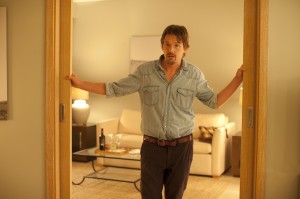 “I mean, you have to stay together for the kids. For now. I understand that. But-”
“I mean, you have to stay together for the kids. For now. I understand that. But-”
“Guys?” It was Steve this time, looking in and blinking in surprise. “What’s wrong? Is the DVD messed up?”
“No, we’re just…” Dennis trailed off.
“How’s the pizza?”
“It shouldn’t even be called pizza,” said Amy, folding another slice and taking an enormous bite. “Pizza’s bread and grease and preservatives. But this is… this is supernatural.”
“Well, I’m off to see a cat about some cat food. Back in an hour.”
“Good,” said Dennis and Amy simultaneously. “I mean,” said Dennis, “that’s fine. We’re good here.”
Steve nodded slowly, then disappeared.
There was a long silence.
“Ethan Hawke… he’s better all the time, I’ll give him that.” Returning their attention to the movie’s details, Dennis felt like he was trying to force his car across the median strip of a highway in order to speed in the opposite direction.
“Oh, man, Sinister,” said Amy. “He was so good in that. And he’s better-looking all the time.” She was just provoking him now. But before he could mention how Hawke was starting to talk like Tom Waits, she said, “What’d you think of Julie Delpy?”
“A force to be reckoned with, as always.” He knew what she was implying. She wanted to know his thoughts about Delpy’s unexpected toplessness. “She’s… fearless. Absolutely fearless. I’ve seen a lot of actresses do nude scenes. Most of the time, it’s unnecessary. But this… this seemed incredibly important to the scene. I showed how we can let intimacy become ordinary if we aren’t careful. I’ve never seen that kind of exposure used so powerfully in an American film. It really accentuated how insensitive they’ve become to each other. How blind.”
“Like that scene with Julianne Moore in Short Cuts.”
“Yes! That, times one hundred.”
“But the chemistry between Hawke and Delpy… they’re just the most convincing big-screen couple I’ve ever seen. The scenes are so long, with so much dialogue, and there’s rarely ever a cut. It’s like some kind of Olympic-level display of memorization and choreography.”
“Like a stage play.”
“Yes.” She was smiling at him now, and they were connecting again, like they always did in an after-movie analysis. “And yet it all feels completely spontaneous. Improvised.” They both loved this process. And they knew how rare it was to find someone else who valued it so much. “You know how much I hate to bring up the Oscars, but…”
“Yeah,” Dennis said awkwardly. “Whatever wins Best Picture for 2013, long after that film’s been forgotten, I can almost guarantee you that actors, writers, cinephiles, and lovers everywhere will still lavish Before Midnight with praise. I think Linklater… Hawke… Delpy… this is their best work. Maybe the first time that a third film has been the best in the series.”
“Wrong!” Amy declared. “You’ve forgotten Harry Potter and the Prisoner of Azkaban. Best in the whole series.”
Dennis bowed. “Correct as always, Master.”
“I can’t pick a favorite,” she said. “Before Sunrise ended so perfectly that I dreaded the idea of a sequel. It captured a kind of relationship that we’ll never get back: Two people fully engaged in each other, with all of their attention, without gadgets or phones getting in the way.”
“Yeah, you’re right. Maybe that’s still the best one.”
“But Before Sunset… it’s perfect too. The cinematography’s glorious. And that ending. It leaves the audience…”
“Paralyzed!” said Dennis. “Breathless.”
“But… you were just saying it represents a total collapse of character.”
“It does,” he quickly added. “But I don’t admire movies based on whether the characters make good choices. I admire them based on how well they’re made. On how truthful they seem. It does everybody good when we see a truthful depiction of bad decision-making. Pastor Bruce would call it a movie about ‘the wages of sin.’ And in a way, he’s right. I completely believed Before Midnight, beginning to end, because you can see the toll that Jesse’s regrets are taking on him. You see the consequences of every mistake in his face.”
“But that’s what’s so beautiful about this series. Jesse and Celine. They get this second chance together. They’ve been through hell, but they stay alive for each other. Because what they found in each other… it’s worth the consequences. It’s better than anything Jesse ever had with… what’s-her-name back home.”
Dennis looked at the copy of Viaggio in Italia. Then he picked it up and knelt down in front of the player. He popped open the case, took out the DVD, pressed his thumb against the sharp edge of the disc, and closed his eyes. He was giving in, and he knew it.
From his jacket pocket, a shrill recording of the opening mandolin notes of R.E.M.’s “Losin’ My Religion” rang out. Startled, he reached for it as if for a lifeline. The text was a message from his ten-year-old — Natalie. She asked if he would be home soon. That could only mean she’d had another bad day post-breakup with her first boyfriend. She hadn’t shown any interest in her father at all during the relationship, but now that it was over, she was suddenly eager to talk to him — well, talk at him, really — late into the night, trying to process what felt to her to be the betrayal of the century.
“You’re not gonna believe this,” he said.
“You have to go.”
“Afraid so. Ten-year-old troubles. Promises to keep.”
“And miles to go,” sighed Amy, “before I sleep.”
“Here’s the thing,” he said. “Jesse and Celine both want true love, because it feels amazing to have somebody sexy and smart and awesome willfully take risks with you, and sacrifice other priorities for you, and declare their love for you is unconditional. Who doesn’t want to receive that? But it’s only true love if you make it so, if both partners commit even when it’s inconvenient. We’re all yearning to see Jesse and Celine together because we want to see true love. But the fact is, true love resists all of the tempting off-ramps and stays on track. Jesse married somebody. Now he acts like he never really ‘connected’ with her. How can he be trusted in anything? Somewhere along the way, he played a part in letting love fall into disrepair. Who is he to talk to Celine about unconditional love?”
“So, is that what you want the fourth film to show us? Should it be about the wife who hates him? Should it be about how miserable she is? And you want him to go back to her? Who wants to see that movie?”
“Nobody. Because nobody wants to see the part of true love that doesn’t look fun. Jesse’s previous marriage is probably damaged beyond repair. But if he never really loved anybody else, which is what he tells Celine… I need an explanation. How the hell did he end up married with a kid? Don’t you think he’s fooling himself?”
“I think you’re such a romantic that you can’t wake up and admit that sometimes people make big mistakes, mistakes that will just get bigger if they persist out of pride.”
“That’s a convenient excuse if you want out of a promise that you made. Remember John Smith in The New World? He let something else become more important to him than the greatest thing of all. And he lost it.”
He knew that, at this point, he was talking only to himself, trying to save himself. But he continued anyway.
“It’s in our DNA. We condemn those who betray us, but when we commit a betrayal, we start scrambling to find some way to rationalize it and excuse ourselves from accountability. That’s what Before Midnight is really about. We hear all of this talk about how long-term relationships are ‘old-fashioned,’ how all lovers are doomed to break up, and how technology will give us the sex of the future. But tell me — don’t you think every moviegoer, of any age, wants the same thing at the end of this movie? Don’t you think everybody wants Jesse and Celine to stay together in spite of the fact that they are at war? We all want to see true love win in the end. We want love to survive the storm. And it’s possible. But it’s difficult. This is the age of consumerism, convenience, and independence, when everything is judged by ‘customer satisfaction.’ We’ve told ourselves that we’re free to walk away from anything that doesn’t make us happy. But happiness is fickle. It’s based on fleeting circumstances. When we only hold on to what is easy and fun, we miss out on what is best.”
He suddenly realized that Amy might think he was calling her “easy.” And even though he feared that he’d regret it, he looked up at her.
Her expression was hard to read, but she applauded him. It was a mocking gesture that effectively cloaked whatever she was really thinking. Still, she couldn’t maintain eye contact. She shifted her gaze back to her iPad.
He dropped the DVD on the top of the player, where it spun around and went still. Then he walked around behind the couch, paused, and — choosing not to reach out and put his hand on Amy’s shoulder — he said, “You know, Star Trek Into Darkness is playing on the other side of the hill. I hear it’s dumb as a bag of hammers, but I’ll bet it’s fun on the big screen. And I know about your thing for Benedict Cumberbatch.”
She laughed bitterly. “You’re right. He’s only four years older than me. We’re perfect for each other.”
Okay, he thought. That stings. It shouldn’t. But it does.
“And if he’s taken, well, there’s always Simon Pegg.”
“You’ll have to lock the door behind me,” he murmured, exhausted. “I’ll see you.”
He walked out, and he didn’t even slow down to ogle the models posing on the Playboy videos this time. Somehow, the air in that aisle seemed stagnant. He strode through it swiftly.
He let himself out, heard the door latch behind him, and texted his daughter back as he stood in the light of the neon frame around a Jack Reacher poster. “Whats ur mom doing?” Was that the right way to text it? Kids got so upset when you texted in a way that looked “old fashioned” to them. Then he slumped into the driver’s seat, put his key in the ignition, and turned it.
The car didn’t start. The battery was dead.
He rested his head against the steering wheel. The phone buzzed. The answer read, “Folding shirts watching Good Wife.”
He texted back. “Battery dead. Video store. Need help.”
Linnea would rescue him. Charge the battery. And drive alongside him all the way home. She’d done that once, back when they were dating, after he left her apartment at 3:00 a.m. He’d been halfway home when he realized she’d come after him in her car, driving along side him in the dark, just to be alongside him, just to watch the night lights flash across his face, just to see him safely home.
Movement inside the All Thumbs Video window distracted him. Amy was there, locking the door. She didn’t look at him. She moved behind the store counter, and started putting magnets of “thumbs up” signs on the movie board next to her name under the category Before Midnight. He watched her count out five “thumbs up” magnets.
But then she put one back, and disappeared into the shadows and the aisles full of dreams.



